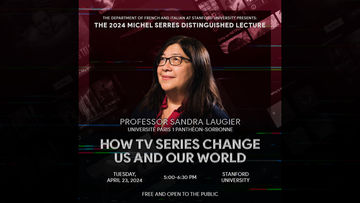The 2024 Michel Serres Distinguished Lecture: Professor Sandra Laugier

Department of French and Italian
Division of Literatures, Cultures, and Languages
France-Stanford Center for Interdisciplinary Studies
Philosophy and Literature at Stanford
450 Jane Stanford Way, Building 260, Stanford, CA 94305
Rm 252
The Department of French and Italian at Stanford University presents:
The 2024 Michel Serres Distinguished Lecture
Professory Sandra Laugier (Philosophy, Université Paris 1 Panthéon Sorbonne, France)
How TV series change us and our world
TV series are increasingly recognized in current research. However, their aesthetic potential for visualizing ethical issues and developing a collective inquiry into democratic values has not yet been fully appreciated. Taking series seriously means investigating creators' intentions, rethinking audiences' capacities, and exploring how TV series structure our understanding of and experience with the world. It means paying attention to popular culture as a moral resource, in the spirit of Stanley Cavell's seminal work on film. It is not a matter of drawing from a reservoir of pat examples, but of inverting and inventing hierarchies of what matters. What we are witnessing in this century may be the realization of what Ralph Waldo Emerson and John Dewey (e.g., in Art as Experience, 1934, 90 years ago) called for: an art rooted in experience and everyday life. Television series are sites where artistic and hermeneutic authority is reappropriated. Panofsky (1936) and Cavell (1971) took as their starting point the popular nature of cinema, its relationship to reality: the integration of film into the life of the spectator, its role in constituting the spectator's experience. Today, television is taking over film's ambition to stimulate and shape the audience's capacity for imagination and foresight. This means "educating one's experience in such a way that one can be educated by it" (Cavell 1981).
Free and open to the public.
Sponsored by the Department of French and Italian, Division of Literatures, Cultures, and Languages (DLCL), the France-Stanford Center for Interdisciplinary Studies, Philosophy and Literature at Stanford, and the Department of Art & Art History Film and Media Studies Program.
Photo credit: Astrid di Crollalanza © Flammarion